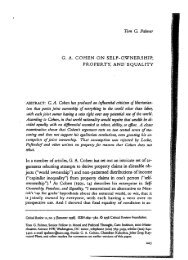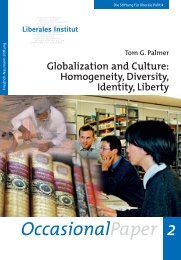Are Patents and Copyrights Morally Justified? - Tom G. Palmer
Are Patents and Copyrights Morally Justified? - Tom G. Palmer
Are Patents and Copyrights Morally Justified? - Tom G. Palmer
You also want an ePaper? Increase the reach of your titles
YUMPU automatically turns print PDFs into web optimized ePapers that Google loves.
No. 8] <strong>Are</strong> <strong>Patents</strong> <strong>and</strong> <strong>Copyrights</strong> <strong>Morally</strong>Jus4fied? 821<br />
each of these arguments’ internal structures <strong>and</strong> then attempt<br />
to apply them to ideal objects. In part II, I will takeup the labor<br />
theory of property, <strong>and</strong> in part III, the personality theory. In<br />
part IV, I will address utilitarian concerns, but, as I have stated,<br />
only briefly. Inpart V, I will discuss the attempt to derive intellectual<br />
property rights indirectly, that is, “piggy-backing” on<br />
rights to tangible property. The concluding sections ofthe Article,<br />
parts VI <strong>and</strong> VII, present my own case for a private property<br />
system that does not recognize copyrights <strong>and</strong> patents. 8<br />
I make no claims to an exhaustive taxonomy of property<br />
rights theories. Other important theories ofproperty<strong>and</strong> other<br />
theoretical concerns are not dealt with here, because I have<br />
chosen to concentrate on those most relevant to the problem of<br />
intellectual property. Further, I will have little to say about the<br />
actual historical genesis of intellectual property; while intellectual<br />
property originated in grants of monopoly from the state<br />
<strong>and</strong> received its legitimacy from that source, the,public debate<br />
over its legitimacy shifted radically in the late Eighteenth Century.<br />
As Fritz Machiup <strong>and</strong> Edith Penrose note, “those who<br />
started using the word property in connection with inventions<br />
had a very definite purpose in mind: they wanted to substitute a<br />
wordwith a respectable connotation, ‘property,’ for a word that<br />
had an unpleasant ring, ‘privilege.’ “~ Given this shift in the<br />
popular conception ofpatents <strong>and</strong> copyrights, I intend to question<br />
whether they are legitimate forms ofproperty at all.<br />
II. LABOR AND THE NATURAL RIGHT TO PROPERTY<br />
Lys<strong>and</strong>er Spooner was surely one of the most remarkable<br />
American men of letters of the Nineteenth Century. He was a<br />
constitutional scholar, a fervent crusader for the abolition of<br />
slavery, an entrepreneur who succeeded through competition<br />
in forcing the American postal service to lower its rates, a philosopher,<br />
a writer on economic matters, <strong>and</strong> more,<br />
Spooner begins his book, The Law ofIntellectual Property: orAn<br />
Essay on the Right ofAuthors <strong>and</strong> Inventors to a Perpetual Property in<br />
T/zeirldea.s,’°by establishing the status of immaterial objects as<br />
8. As will be demonstrated, however, the approachI set forth would include trademarks<br />
<strong>and</strong> tradesecrets as legitimate. Trademarks <strong>and</strong> trade secrets have roots in the<br />
common law<strong>and</strong> enjoy acontractual or quasi-contractual moral grounding.<br />
9. Machlup & Penrose, The Patent Controversy in the Mneteenth Century, 10 J. ECON.<br />
HIs~r.I, 16 (1950).<br />
10. Spooner, The Law of Intellectual Property: or An Essay on the Right of Authors <strong>and</strong> In-











